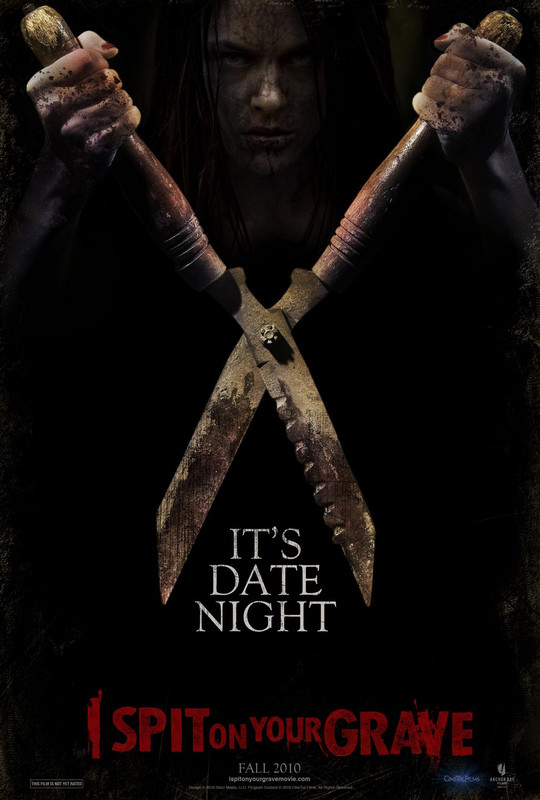I Spit on Your Grave opens on January 11th 2011. You can see the UK trailer HERE
Dir: Steven R. Monroe
It’s not the most censored, though 32 years later you still can’t see it uncut, but of all the video nasties the original I Spit on Your Grave, which was made for peanuts by Mier Zarchi, is perhaps the most infamous, and not only because of its spectacularly lurid title. It’s perhaps one of the most difficult and distressing films I’ve ever seen and, for all its many flaws, it gets under your skin to the point that after watching it you feel like you need a shower to get it off you. It is, then, an odd choice for a remake, because what more can you do, how much more extreme can you be?
Steven R. Monroe’s film is, in general shape, very faithful to Zarchi’s blueprint. Jennifer Hills (Sarah Butler) is still a young novelist who arrives at a remote cabin to work on her second book. After a few nights some local men come calling, they break into the cabin and ultimately rape and beat Jennifer almost to death. A few weeks later Jennifer, physically recovered, enacts systematic and terrible revenge on the men who attacked her. It is, essentially, the same blueprint as every rape/revenge movie from Thriller: A Cruel Picture to The Brave One. Where Monroe’s film differs from Zarchi’s is in the amount of detail it provides. Where Zarchi’s film seemed most interested in the horror of the acts it depicted, Monroe’s takes more time to build its characters (especially those of the group of men that attack Jennifer), with the characters of the rapists this is pretty effective; they are cartoons in the original, and if anything giving them more background serves to drop them from an even greater height.
In many ways this I Spit on Your Grave is better made than the original, yet that’s also what sometimes undermines it. Though it was made for just $1.5 million, the 2010 film looks outstanding. The images are crisp and cinematic, and that’s exactly the problem. This sheen about the film (which continues with the casting, Butler in particular being rather too Hollywood pretty for her role) is a little distancing when compared to the down and dirty feel of Zarchi’s film which, whatever you feel about the morals of this choice, really did put you right in amongst what was happening, and created at times the deeply unnerving feel that what you were seeing just could be real. Put simply you watch this film, but you survive the 1978 version.
To give credit where it’s due, most of the performances here are considerably better than those of the 1978 version. Along with being given more character traits and being much more fully developed we now have some capable actors playing Jennifer’s attackers, with Andrew Howard turning an especially impressive performance as a sadistic sheriff who is also a family man (in the film’s most striking, and in some ways most horrific, scene he takes a phone call from his young daughter while the other men rape Jennifer just a few feet away) and Chad Lindberg much more convincing as a retarded adult than the original’s Matthew. On the whole, the first half of the film, documenting Jennifer’s arrival at the cabin and the series of attacks and rapes she is subjected to, works very well. It may look prettier, but the events are still just as nasty, brutal and horrendous as they were in the original film. It’s when we reach the revenge section that I begin to have real problems with this I Spit on Your Grave.
The original film is about the degradation of violence. Jennifer’s vengeance is short and brutal; an act of purging, driven, it seems, as much by a need for closure as for vengeance. It’s also surprisingly underplayed, with the gore much more implied than it is shown. This, however, is the age of Saw and thus here the vengeance is played up to a ludicrous degree. The problem is that I think we’re supposed to enjoy it, and that’s a real sticking point for me. There is an interesting question about the second half of this story, which the film never quite addresses, which is whether Jennifer actually lived through her ordeal. Butler’s performance is ambiguous, but there are definite hints here that Jennifer may be little more than a spirit of vengeance, and I think I prefer that idea to the perhaps more persuasive alternative, which has her dealing with her ordeal through complex tortures meted out to her attackers, each capped off by some meaningful detail or wisecrack to get us to embrace and applaud this extreme vigilantism. The violence here is much more explicit and dwelled on much longer than in the 1978 film, to such a degree of extremity that I began to question exactly how justified Jennifer’s actions were (especially in relation to the Sheriff). It’s unpleasant, sure, but feels more like a carrot for the audience than anything else.
This is a difficult film to review. From a technical standpoint, especially given the budget, it’s excellent and Monroe certainly shows that he knows how to discomfort an audience (a skill that will serve him well in this genre) but it’s so bound up with another film, and though the 1978 film is not, by most traditional measures (excepting Camille Keaton’s remarkable, haunted, performance, which Butler completely fails to match) as ‘good’ as this one it is undeniably the more effective film. I guess it comes down to what you want out of a movie. If you want the catharsis of cheering at Jennifer’s vengeance then this is the version for you, but if you really want the full impact of this story then stick with the 1978 version. Neither is an easy watch, but neither is uninteresting.
★★☆☆☆


No comments:
Post a Comment